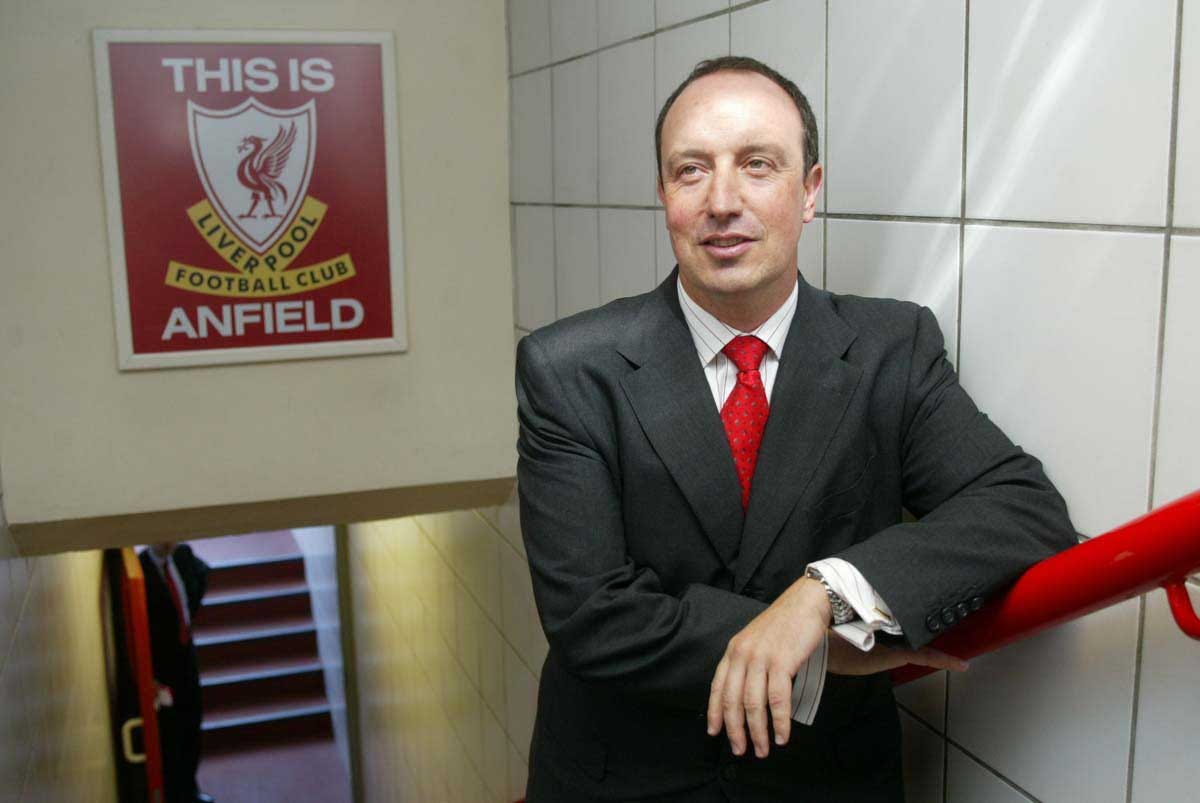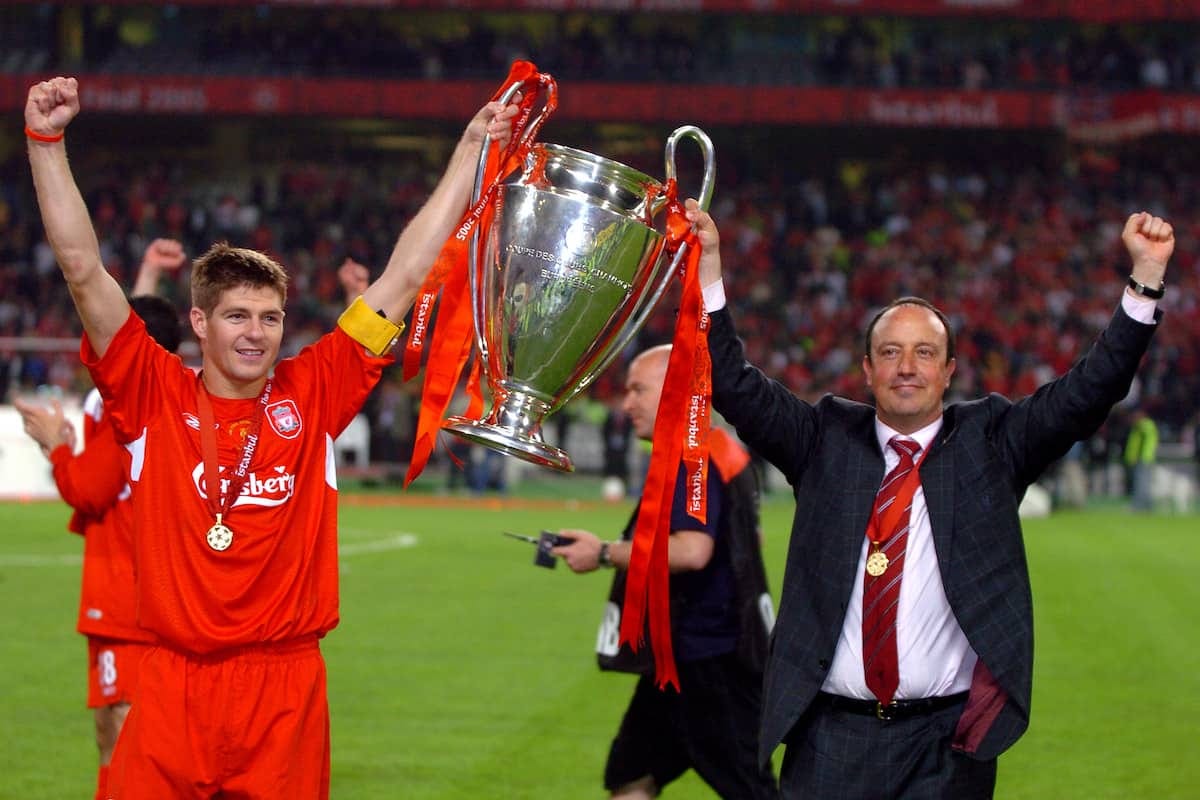System Over Sentiment: How Benítez Rewired Liverpool Football Club
From Valencia brilliance to Istanbul immortality, a forensic look at the order, mindset and methods Rafael Benítez embedded at Liverpool.
Steven Gerrard on Rafa Benitez:
“Rafa’s world-class and he’s brilliant. He’s brilliant for me in terms of development, personal one-to-one stuff. Quite a cold manager at times, but in terms of tactically, the best I worked with.”
“Rafa really got me to understand the tactical side of the game more, game intelligence, different IQ.”
“From ‘04 to ‘07 I felt really strong. Rafa had tactically got me in a really good place as well. In my early years I was a bit of a free spirit, maybe lost my position a little bit too much, but Rafa really got me to understand the tactical side of the game more.”
- Quotes from Rio Ferdinand Presents (October 20025)
Roots of Expectation
When Rafael Benítez was appointed Liverpool manager in June 2004, it felt like more than a new face at the helm. I spent a lot of time in Spain in the early years of the century, and had stood under the floodlights at the Mestalla watching Valencia dismantle opposition with clinical precision; to me, this wasn’t just another managerial appointment. I had seen what his Valencia side could do. They weren’t just winners. They were machine-like in their efficiency, with steel behind every movement and tactics that suffocated opponents. Twice champions of Spain in three years and crowned UEFA Cup winners to top it off, Valencia under Benítez had defied the usual axis of Real Madrid and Barcelona.
When he walked through the doors at Anfield, it brought a quiet kind of hope. Not the rousing, rallying-cry sort. It was the kind of hope that speaks in lowered voices and fixed gazes, the belief that perhaps now, at last, someone with a plan had arrived. Liverpool needed more than motivation. They needed structure. They needed footballing sanity.
A Measured Man for a Chaotic Time
Benítez did not arrive like a rockstar. No clever soundbites. No grandiose promises. He stood in front of the media in a pressed shirt and tie and told them plainly that he wanted to win. There was an awkwardness to him, a reluctance to perform. But it was refreshing. This wasn’t a man who wanted to charm his way into the hearts of Liverpool fans. He wanted to earn it, methodically and completely.
Back then, Liverpool were still stumbling through the aftermath of Houllier’s latter years. Cup wins had papered over the cracks, but in the league the club had become stale. Gerrard was contemplating leaving. Michael Owen had one foot out the door. The team looked fragmented, unsure of its identity and even less sure of its direction.
Benítez’s first job wasn’t to win titles. It was to restore order. And he did that by stripping things down to their foundations. He focused on the basics that had been long neglected. Diets. Training habits. Tactical shape. Positional discipline. Every detail mattered. This was not about reinventing football. It was about reminding professional players of the discipline required to play it properly.
Obsession as a Superpower
The thing that struck me most about Benítez wasn’t just his focus. It was the almost clinical way he approached every aspect of the job. One former player described him as “scrupulous”. That word sits perfectly with the man. Every session was prepared with a precision that bordered on alarming. Warm-ups weren’t routines, they were instructions. Movement wasn’t about flair, it was about geometry.
He even redefined what training meant. Footballs were often removed entirely from sessions. Instead, players were drilled on shape and spacing. Benítez called it the Integral Method. Preparation for every scenario. No gaps in the armour. No excuses for failure. Some players, especially those who thrived under chaos, found it stifling. But those who endured, and improved, would go on to become some of the most intelligent footballers in the game.
Benítez did not treat players like stars. He treated them like employees with a job to do. For a club like Liverpool, where emotion and romance are often mistaken for strategy, this was both controversial and absolutely necessary.
Rebuilding the Core
One of the first signs that Benítez understood the scale of the challenge was in his transfer dealings. Luis García, Xabi Alonso, and a handful of others arrived not because they were stars but because they understood systems. Alonso in particular represented a change in tempo. He didn’t run like a sprinter, but he moved the ball like a metronome. He gave Liverpool the rhythm it had been missing for years.
The exits of players like El Hadji Diouf and Salif Diao were less about quality and more about attitude. Benítez was reshaping the dressing room as much as the pitch. He needed players who could survive the scrutiny and match his intensity.
Early results were mixed, but it was never about the first ten games. It was about the long haul. Gerrard, who had considered leaving for Chelsea, began to see the shape of something new. He later admitted Benítez made him rethink what it meant to be a footballer. Less chaos. More control. And within that control, the chance to thrive.
Even in that first season, with all the inconsistency of transition, you could see it beginning to take root. Liverpool didn’t play expansive, free-flowing football. They played football with a plan. And when you’ve spent years watching a team improvise their way through matches, a plan is a beautiful thing.
The Tone, The Vision
What Benítez did, above all, was recalibrate the expectations of what a Liverpool manager should be. He was not a motivator. He was not a symbol. He was not a showman. He was a coach. And that was exactly what the club needed at that moment.
He gave Liverpool back its seriousness.
At a time when the club was drifting, when nostalgia had begun to masquerade as ambition, Benítez arrived with a toolkit instead of a megaphone. He didn’t demand worship. He demanded organisation.
Supporters who followed the club week in, week out began to notice the difference in tone. Gone was the forced optimism and in its place a kind of quiet steel. And that is why his arrival was so exciting to me, not just because of his success in Spain, but because I knew we were finally being managed by someone who did not believe in luck.
In the end, it wasn’t his personality that mattered. It was his process. He didn’t need to tell us he had a vision. You could see it every time his team took to the pitch with discipline, shape, and purpose.
What followed in the years ahead would vindicate that feeling. But in those early months, long before the trophies, long before the night in Istanbul, the revolution had already begun. Quietly, intelligently, and unapologetically.



